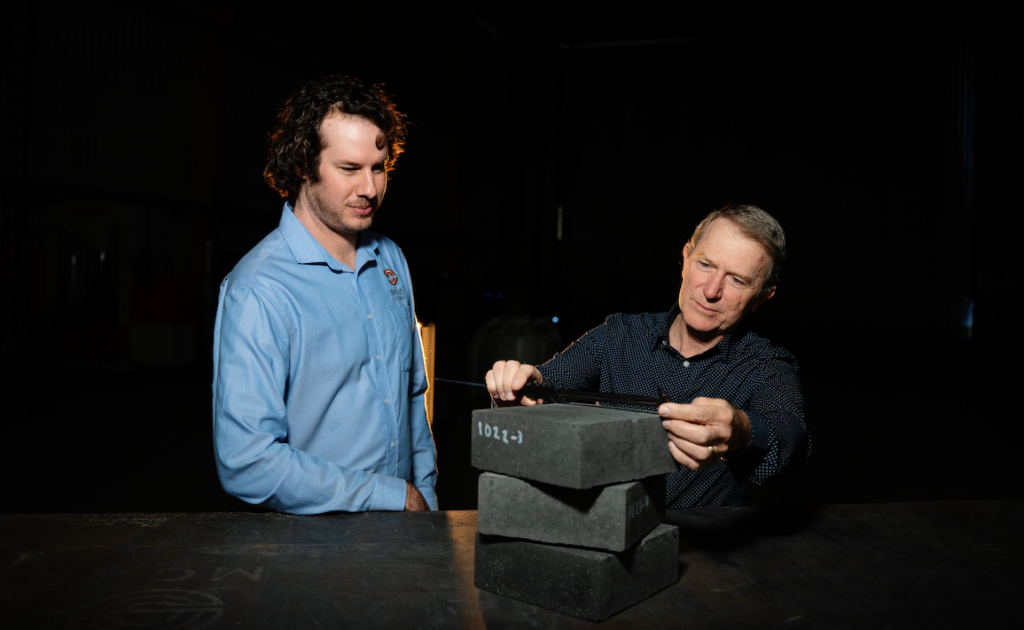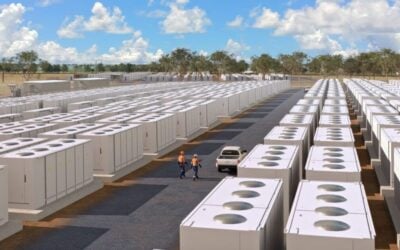
Australian startup MGA Thermal has bagged around US$1 million in government funding for a 5MWh thermal energy storage project while Israel-based Brenmiller Energy has inaugurated a 1MWh unit in Brazil.
1MWh system online in Brazil
Brenmiller and Fortlev, a Brazilian manufacturer of water tanks, pipes, and water connections, have inaugurated the bGen thermal energy storage unit at the latter’s production facility in Anápolis, Brazil.
Enjoy 12 months of exclusive analysis
- Regular insight and analysis of the industry’s biggest developments
- In-depth interviews with the industry’s leading figures
- Annual digital subscription to the PV Tech Power journal
- Discounts on Solar Media’s portfolio of events, in-person and virtual
The bGen system will allow Fortlev to use renewable biomass instead of natural gas to heat the air it uses to manufacture plastic water tanks, reducing fuel costs by 75% and lowering greenhouse gas emissions by 800 metric tons a year.
The system heats crushed rocks to 600° Celsius which can then store that thermal energy for minutes, hours or days, to be used later to produce heat energy in the form of steam, water or hot air to mould plastic or other industrial products.
The company said it is the first thermal energy storage system powered by renewables to be put into commercial operation in South America, and the first anywhere to generate hot air for manufacturing plastic products using renewable power.
Although the project with Fortlev does not appear to do so, the bGen system is designed to charge by harvesting waste heat from a factory’s chimney system using an insulated ducting system. The storage system comprises a modular rock-based design with a thermal capacity of between 1 and 1,000MWh for each unit.
It can also discharge electricity using a steam turbine system with a startup time of five minutes-plus.
Avi Brenmiller, chairman and CEO of Brenmiller Energy said: “Our bGen technology enables these companies to start using renewable energy resources and waste heat to efficiently produce clean steam, hot water, and hot air on-demand, allowing them to decarbonize their thermal process – and in some cases, like Fortlev, reduce their fuel costs while doing so.”
Thermal energy storage pilot project funded
In a piece of concurrent news, Australia-based company MGA Thermal has been awarded AU$1.27 million (US$0.9 million) from the Federal Australian Renewable Energy Agency (ARENA) to fund its pilot thermal energy storage solution.
The money will help fund the creation and installation of a 500kW/5MWh storage prototype to demonstrate the generation of steam from stored thermal energy, which is expected to cost a total of AU$2.85 million. The company expects it to produce performance data and a tangible demonstration of the technology for potential customers.
The company claims it has a current customer interest of 20GWh for its solution and recently unveiled the first stage of its commercial manufacturing facility in Newcastle, New South Wales. The facility will be able to produce over 1,000 of its blocks, totalling 1MWh of thermal energy storage, a day by the end of 2022.
The first of those blocks will go to a partnership with Toshiba International Corporation and Graphite Energy to produce green hydrogen, funded by a AU$9.8 million grant from the Australian Government’s Modern Manufacturing Initiative.
“While conventional storage technologies like batteries are no doubt important to that mission (of the renewable energy transition), we believe our MGA Thermal Blocks will be a major part of that transition, to retrofit existing thermal power plants and support development of low-cost renewable energy storage and green hydrogen,” said Erich Kisi, co-founder and CEO of MGA Thermal.
“Utilities around the world have told us they need this type of technology to make that move, and we are well on our way to building the capacity to meet that demand.”
The thermal energy storage sector has gained traction in the last few months with several high-profile projects and announcements.
Last month, and at the less technologically novel end of the scale, Swedish utility Vattenfall started filling up a 200MW-rated water tank in Berlin which will hold 56 million litres of water to be fed directly into the district heating network.
A few weeks prior to that, a project in Australia combining multiple renewable technologies including thermal storage, Aurora, was revived and a memorandum of understanding (MOU) was signed between two companies to build a 2GWh pumped heat storage project in Bulgaria.
In March, a flurry of positive reports covered by Energy-Storage.news showed a maturing sector. These included a two-year evaluation study validated by utility Edison International, another Israeli company Nostromo Energy achieving 100% round-trip efficiency for its system, and an intellectual property (IP) acquisition.






